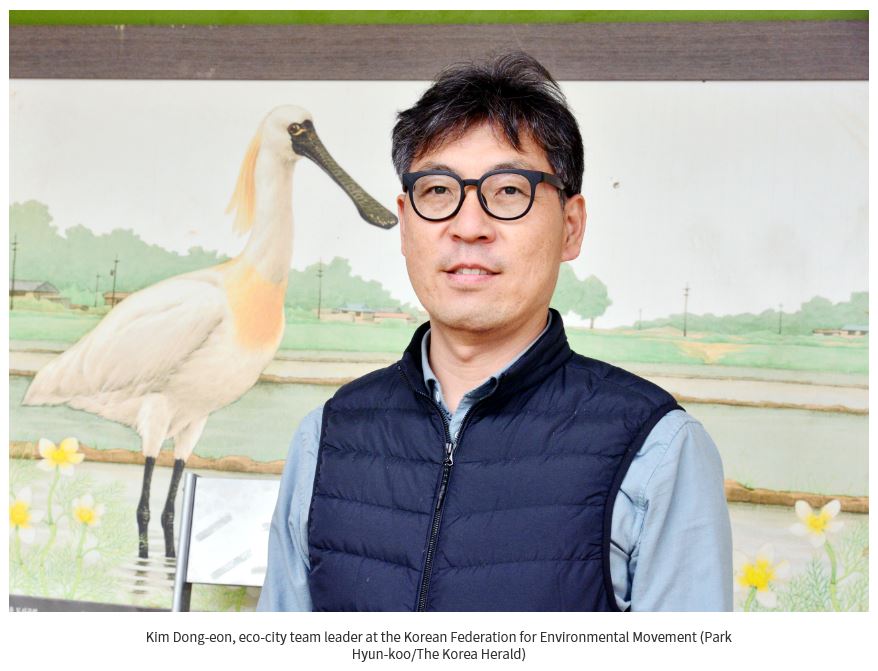
While politicians make real estate development in Seoul their top priority, environmental campaigners say the next mayor must pay more attention to climate and environmental issues for the sake of future generations.
“The direction we’ve been running so far has been to create added value by building more properties, roads and cars. I think it is time that we can turn around a little,” said Kim Dong-eon, eco-city team leader at the Korean Federation for Environmental Movement, in an interview with The Korea Herald.
The KFEM, which was set up in 1993, is one of the country’s largest local environmental civic groups, dealing with water, ecology, climate change, energy and green mobility.
“If Seoul continues to be obsessed with reckless development disregarding the environment, this will damage our children’s health and drive them into a desolate place. The minimum measures to prevent it are forming more green areas, parks, forests and wetlands,” Kim said.
Seoul has 4.38 square meters of green space per person, far below New York’s 23 square meters and London’s 27 square meters. The World Health Organization recommends that cities offer at least 9 square meters of green space per person.
Kim understands that it is not easy for politicians to juggle the interests of all stakeholders.
“People seek immediate convenience rather than passing on a healthy environment for future generations. People still want to have more buildings, parking lots, car roads and entertainment facilities,” he said.
“But politicians should be able to see far away, have a philosophy and persuade people to move in a better direction rather than catering to the current popularity. They should consider children who will live in the future but cannot represent themselves in the current political space.”
Having said that, Kim has seen society make progress little by little.
“Compared to the past, more people talk about forest value, carbon reduction and the need to respond to the climate crisis. This is because more people sympathize with environmental values and some countries, especially European countries, set an example and press other governments and companies,” he said.
As a member of the C40, a group of large cities around the world that have promised to respond to climate change, Seoul has to submit a plan to achieve carbon neutrality by 2050. The city is complementing its 2050 greenhouse gas reduction strategy, which it announced last year, with other steps in discussions with the C40.
In July last year, the Seoul government proposed a goal of achieving carbon neutrality by 2050 and an intermediate goal of reducing greenhouse gases by 40 percent by 2030 compared with 2005 levels.
“In order to achieve the goal, the current policies are not enough. Seoul needs to have stronger environmental policies, especially in the building and transport sectors,” said Lee Woo-ri, climate and energy team leader at the KFEM.
About 70 percent of Seoul’s greenhouse gas emissions come from buildings and around 20 percent come from transportation.
“In the building sector, the city can implement various methods, starting with the public sector, to reduce carbon emissions by using solar panels, insulating buildings or adopting energy control systems. In the transport sector, the city should shift its car-centered mobility into eco-friendly transport,” she said.
Lee said it is necessary to make the city friendlier to cyclists and pedestrians.
“Cycling has been ubiquitous in European countries. They have long responded to greenhouse gases and have continued to supplement their policies. It is regrettable that it is not much discussed in Seoul,” Lee said.
According to the European Cyclists’ Federation, the continent’s cities resolved in 2020 to create at least 1,000 kilometers of cycle lanes, as well as take steps to reduce traffic and designate car-free streets. According to a Forbes article, it is predicted that twice as many bikes as cars will be registered in Europe each year by 2030.
Cycling is a common mode of transport in the Netherlands, Norway, Sweden, Germany and Denmark. Paris is set to remove about 70,000 parking spots from its streets to make the city greener and expand bike lanes.
By Shin Ji-hye (shinjh@heraldcorp.com)
http://www.koreaherald.com/view.php?ud=20210407000282&np=1&mp=1